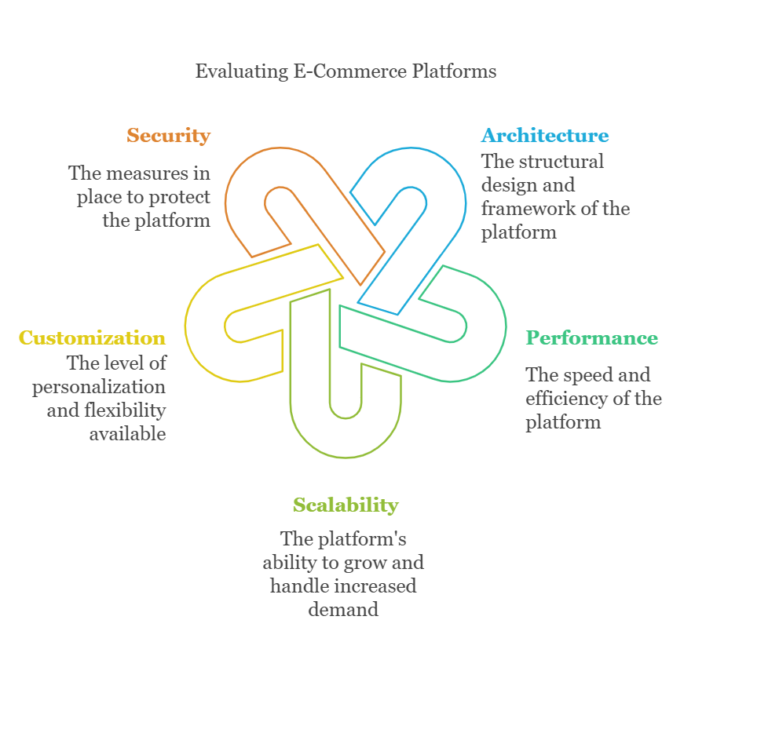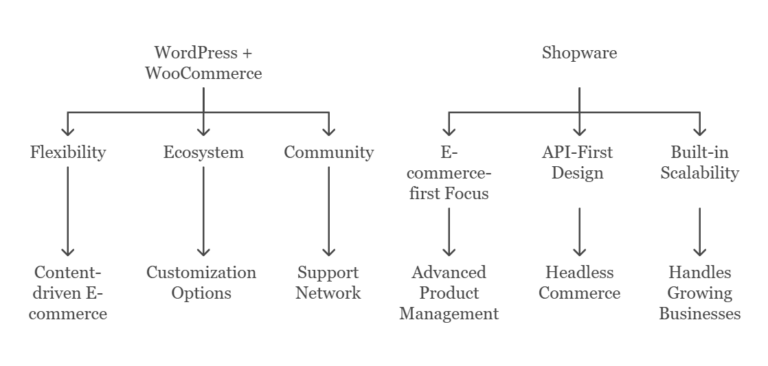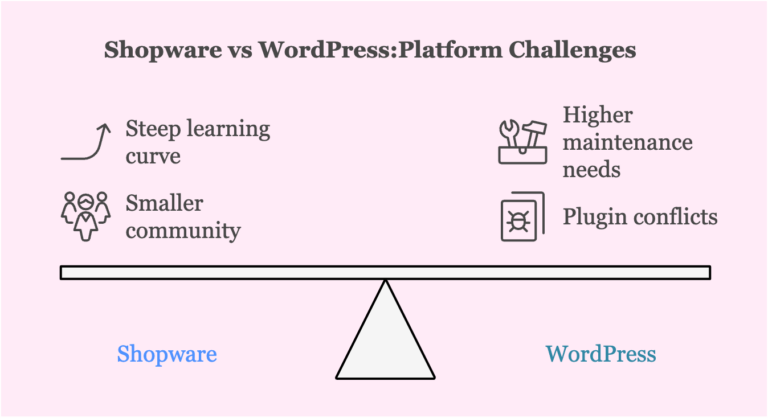Greetings! I'm Aneesh Sreedharan, CEO of 2Hats Logic Solutions. At 2Hats Logic Solutions, we are dedicated to providing technical expertise and resolving your concerns in the world of technology. Our blog page serves as a resource where we share insights and experiences, offering valuable perspectives on your queries.

Quick Summary
Shopware excels in native e-commerce capabilities, scalability, and security, making it ideal for serious online retailers. WordPress with WooCommerce offers more flexibility but requires extensive customization for enterprise e-commerce. Choose Shopware for a pure e-commerce focus and WordPress for content-heavy stores with basic e-commerce needs.
Choosing the right e-commerce platform is like laying the foundation for your house. Everything you build depends on it. With global e-commerce sales projected to hit $6.3 trillion in 2024, the stakes are higher than ever.
Credits:Shopify
When deciding between Shopware and WordPress, you’re not just picking a platform. You’re selecting the backbone of your business’s future success. In this blog, we will compare the functionalities of both platforms to help you choose the right one.

Let’s dive deep into how these platforms compare across key factors like architecture, performance, scalability, etc.
Key Strengths of WordPress
WordPress powers 43.2% of all websites globally, and its WooCommerce plugin drives 28% of online stores. Originally launched as a blogging platform in 2003, WordPress evolved into a flexible CMS capable of supporting e-commerce through WooCommerce.
- Flexibility: Ideal for content-driven e-commerce sites like blogs with online stores.
- Ecosystem: Over 59,000 plugins and themes, offering various customization options.
- Community: A massive support network and resources available worldwide.

Key Strengths of Shopware
Shopware started in Germany in 2000. This is a dedicated e-commerce platform that serves over 50,000 merchants worldwide. It is designed specifically for online retail. This makes it a strong contender for mid-to-large-scale e-commerce businesses.
- E-commerce-first Focus: Features like advanced product management, customizable checkout, and integrated marketing tools.
- API-First Design: Ideal for headless commerce setups.
- Built-in Scalability: Handles growing businesses without relying heavily on third-party plugins. But in some cases, plugins are required to increase the functionality.
Flexible, scalable, and packed with powerful features to grow your business. 🚀
Core Architecture
The architecture of these platforms significantly impacts certain features. They are performance, scalability, and ease of use. Here’s how they compare:
| Feature | Shopware | WordPress + WooCommerce |
| Core Focus | Pure E-commerce | Content Management with E-commerce Addition |
| Architecture | Symfony-based, API-first | PHP-based, Plugin-dependent |
| Database | Optimized for Products | Optimized for Content |
| Scalability | Built-in | Plugin-dependent |
| Updates | Unified System | Multiple Components |
Shopware’s Architecture:
- Headless Commerce: Its API-first approach enables integration with external systems like PIMs and ERPs.
- Unified Codebase: Easier to maintain and update.
- Enterprise Stability: Built on the Symfony framework, offering robust scalability.
WordPress’s Architecture:
- Flexibility Comes at a Cost: While the platform is highly adaptable, managing plugin interdependencies can lead to conflicts.
- Content-first Design: Great for sites that prioritize blogging or content marketing over e-commerce.
- Maintenance: Requires regular updates for core, plugins, and themes.
Performance
Performance testing on identical hosting environments with 100 products loaded revealed the following:
| Page Type | Shopware | WordPress + WooCommerce |
| Homepage | 1.2s | 2.1s |
| Product Page | 1.4s | 2.5s |
| Category Page | 1.3s | 2.3s |
Loading Speed Comparison: this may change according to different scenarios. (Default Installation)
Takeaway: Shopware’s architecture offers faster load times out of the box, which can significantly improve the user experience and conversion rates.
Scalability: Growing with Your Business
Shopware is inherently built to handle scalability, making it an ideal choice for businesses planning rapid growth. Features like multi-store management, advanced Shopware caching, and enterprise-ready integrations come standard.
In contrast, WordPress relies heavily on plugins to scale. While it can handle large volumes of traffic. This often requires substantial investment in hosting and custom development.
Feature Comparison: Head-to-Head
| Feature | Shopware | WordPress + WooCommerce |
| Multi-store Support | Native | Plugin-dependent |
| SEO Tools | Advanced, Built-in | Basic (plugins like Yoast needed) |
| Marketing Features | Included (coupons, promotions) | Plugin-dependent |
| Customization | Flexible, Developer-friendly | Extremely Flexible (theme/plugin ecosystem) |
| Community Support | Growing (Europe-focused) | Massive, Global |
Pricing: A Cost Perspective
- Shopware: Offers a free Community Edition and other Shopware editions for larger businesses. While the upfront cost for enterprise features can be higher, the unified codebase reduces long-term maintenance costs.
- WordPress: Free to start but can quickly become expensive due to premium plugins, themes, and hosting requirements.
Disadvantages of Each Platform

| Platform | Disadvantages |
| Shopware | Smaller community, fewer third-party plugins, steep learning curve for beginners |
| WordPress | Plugin conflicts, higher maintenance needs, less optimized for large-scale e-commerce |
Community and Support
Shopware has a growing, enthusiastic community that’s especially strong in Europe. Key aspects of its community and support include:
- Dedicated Forums: Shopware’s forums are highly active, with threads ranging from troubleshooting to advanced development tips.
- Developer-Focused Resources: Comprehensive documentation and help centers for both beginners and experts.
- Official Support Plans: Shopware offers paid support plans, providing businesses with direct access to technical assistance.
- Local Meetups: Regular community-driven events and Shopware user groups, particularly in Germany and other parts of Europe.
While Shopware’s community is smaller than WordPress’s, its focus is on quality interactions.
WordPress Community and Support
WordPress has one of the largest and most diverse communities. Here’s what makes it stand out:
- Global Reach: Millions of users, developers, and designers contribute to forums, blogs, and knowledge bases.
- Extensive Documentation: WordPress and WooCommerce offer tutorials, how-to guides, and FAQs.
- Third-Party Support: A huge number of agencies and freelancers specialize in WordPress development.
- Meetups and WordCamps: Regular events around the globe bring the community together. This helps to share knowledge and network.
Which Platform is Right for You?
There are specific conditions where Shopware or WordPress would be the right choice. Let’s explore them.
Choose Shopware if:
- You are building a mid-to-large-scale e-commerce store.
- Scalability and enterprise-grade features are priorities.
- You prefer an all-in-one system with minimal reliance on third-party plugins.
Choose WordPress if:
- Your focus is on content-driven e-commerce or blogging with an online store.
- You need maximum customization flexibility.
- Budget constraints make free plugins and themes more appealing.
Make the Smart Move with 2Hatslogic
Ultimately, the choice between Shopware and WordPress comes down to your business. It depends on needs, budget, and plans.
Elevate your e-commerce business with Shopware. 2Hatslogic is your ideal partner for a smooth transition and successful implementation. Don’t let an outdated platform hold your business back.
Contact 2Hatslogic today for a free consultation and discover how we can help transform your online store with Shopware. Book your free consultation now and learn how we can help you achieve your e-commerce goals with Shopware.

Related Articles






